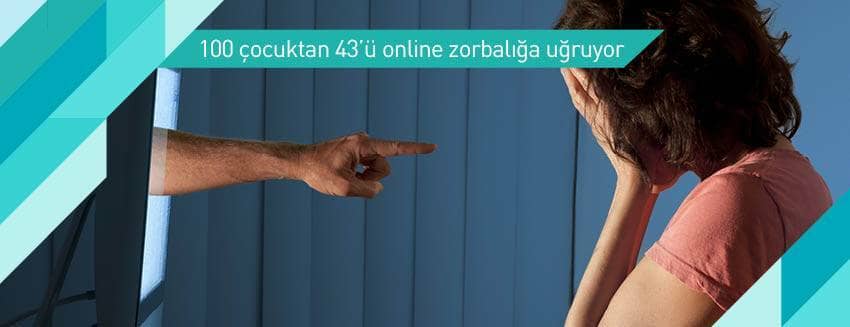
Prof. Dr. Nesrin Dilbaz says, "We need to start a socially sustainable campaign against cyberbullying. We can reap the fruits of a campaign that starts now in 20 years."
Today, young people spend most of their days online. They are exposed to negative situations such as violence, pornography and cyberbullying. This not only affects their mental development but also seriously impairs their mental health. According to global data, 43 percent of young people have been bullied online at least once. The age of virtual gambling has dropped to 14. Last year, more than 100 children committed suicide because of internet games. We talked to Prof. Dr. Nesrin Dilbaz, a psychiatrist and expert on addiction, about how to protect our children from bullying and how to teach them to protect themselves against this frightening picture.
- Why has bullying among children increased so much?
Today's parents have the psychology to give the world for their children. They give them painkillers before they even have a headache and constantly give them meaningless praise. Only their own children are at the center of the world. When technology came into play, children started to believe in this reality. They are too individualistic, they have no empathy. As a result, when they come together, they cannot be a team. Because they don't like anyone, there is always a sense of inadequacy. Today, one in every 10 children or adolescents is diagnosed with mental illness. This means 2-3 children in almost every class.
Bullying has always existed. Because it is a phase of life. But in our time, we used to unite against the bully and a healthy dynamic was established within ourselves. Now this doesn't exist because individuality is at the forefront. On top of that, bullying cases have increased tremendously because bullies can fearlessly do what they cannot do under normal conditions over the internet. Especially bullying between both sexes is very high. Girls bully girls a lot about their physical characteristics. Boys also humiliate and bully both sexes about their gender characteristics. It is much easier for them to do these things in the virtual environment. He can say whatever he wants and announce it to a very large audience at the same time.
- What are the profiles of bullying and bullied children?
Children who bully are usually the only child or the first child. These are families where there is physical or psychological violence. Regardless of economic class, children who grow up with the assumption that parents humiliate each other, that being strong wins, that you have to exist by crushing the other person. For example, at home the father constantly blames the mother. The child models this. When talking to children who bully, they always say that the other side deserves it. They even blame their own mistakes on others. Those who are bullied are chosen from among young people who keep to themselves, who are not very sociable, who do not stand out, who are successful in their studies and who cannot speak out. Children who are bullied are so severely traumatized that they develop many disorders such as depression and eating disorders.
[news=virtual-games-can-turn-into-real-life]
- What should be the role of families?
Actually, everything starts with the upbringing of the families. Children who are bullied are usually the ones who are criticized a lot, who are not allowed to talk. They are prevented from expressing themselves. Since the family's way of coping with stress is to ignore, the child becomes more withdrawn when bullied. Parents should observe their children very well. They should develop themselves and equip them with skills that will make them feel more valuable in the group. They should have a hobby and a skill so that they have self-confidence. Because bullying does not start in high school, we see it starting from primary school.
It is very important to build mental flexibility and resilience. Because as parents, we cannot prevent every danger, but we can equip our children to protect themselves when necessary. Good mental health helps children perceive and explore the outside world, express and manage their emotions, and build healthy and good relationships. We should have social campaigns on this issue. We also need trained teachers to convey these campaigns. If we start a program now, we will reap the fruits in 20 years.
[haberyatay=game-addiction-more-dangerous-than-drugs]
- Is it possible to protect children without banning the internet?
The internet is a fact of our lives. It is important not to not use it, but to use it in a beneficial way. We need to teach children to respect the lives of others on the internet, as in every aspect of life. It is not important how long they use it, but how they use it. I think that until the age of 15-16, children's computers should be with their parents, not in their rooms. While we think they are in their rooms, they could be anywhere in the world, talking to anyone. Also, parents should explain from a young age that private things should not be shared on the internet. Just as we explain this in normal life for security purposes, we should explain this for the virtual world as well. They should provide explanatory information, especially on issues such as video chatting or sending photos.
[habersade=sanal-bagimlilik-ve-tedavisi]
Young people suffer from anxiety the most
According to research, the most common mental disorder among the country's youth is anxiety disorder (20 percent in girls and 10 percent in boys), followed by depressive disorder and substance use disorder. According to the World Health Organization (WHO), depression is the most important factor causing illness and limiting physical abilities in children aged 10-19.








